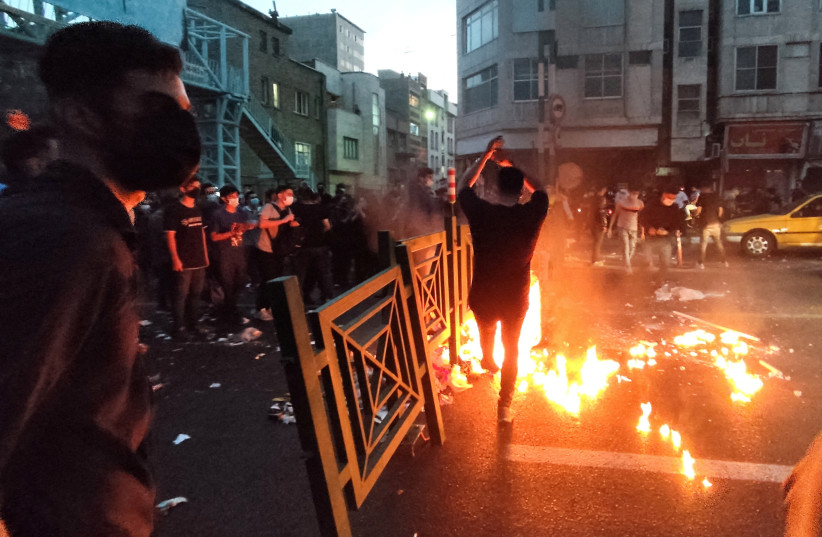On September 16, Mahsa Amini died in Tehran’s Kasra Hospital under suspicious circumstances after she was taken into custody by Iran’s Guidance Patrol, popularly known as the morality police, for improperly wearing her hijab, the traditional Muslim head covering. The authorities attributed her death to a heart attack and brain seizure supposedly resulting from an underlying medical condition. But eyewitnesses and leaked evidence point to a severe beating at the hands of the morality police as the real cause of her death. This set off mass protests across the country and around the world, bringing new critical attention to the power wielded by the government agencies charged with enforcing dress codes and other religiously inspired laws in Iran and other countries.
For more stories from The Media Line go to themedialine.org
Soon after Iran’s 1979 revolution that ousted the Shah and established the Islamic Republic under the rule of Ayatollah Ruhollah Khomeini, Iran required all women in the country, regardless of religion, to wear hijabs covering the head, neck, and hair. Initially, the hijab rule was applied only in workplaces and government offices. From 1983, however, the hijab became mandatory everywhere in public. By law, violators could incur punishments of prison, fines, and whippings of up to 74 lashes.
Iran’s hijab rules, along with other Islamic regulations and standards of social behavior, were first enforced by the country’s Islamic Revolution Committees, also known simply as the Committee. The Committee was formed as an arm of the Interior Ministry and was later folded into the Law Enforcement Force of the Islamic Republic of Iran. In 2005, the Guidance Patrol was established and given the role of religious morality police, reporting directly to the supreme leader, Ayatollah Ali Khamenei.
The scope of the Guidance Patrol’s activities is extensive. Misagh Parsa, in his book Democracy in Iran, reports that in a three-month period in 2014, 220,000 women were taken to police stations and made to sign written promises that they would wear hijabs; 19,000 were given warnings due to inadequate hair covering; and 9,000 were detained for violating the dress code. During an eight-month period the following year, tens of thousands of women were stopped for driving in improper dress, with most losing the use of their cars for a week. Amnesty International reports that the hijab requirement has been imposed on girls as young as 7 years old.
Morality police in Saudi Arabia
Saudi Arabia’s Committee for the Promotion of Virtue and the Prevention of Vice was established as an Islamic religious police force to supervise both markets and public morality in 1976 when it came under direct royal command and the director of the committee – a descendant of Muhammad ibn Abd al-Wahhab, the founder of Wahhabi Islam – took a seat on the Saudi cabinet. At this point, committee members enjoyed almost total power to arrest, detain and interrogate those suspected of violating Sharia, or Muslim religious law.

In May 2006, the Saudi Interior Ministry issued a decree restricting the power of the committee, also commonly known as hai’a, or committee. According to the decree, “The role of the committee will end after it arrests the culprit or culprits and hands them over to police, who will then decide whether to refer them to the public prosecutor.” Two years later, after two people died in the committee’s custody in less than two weeks, a department of rules and regulations was established to ensure that committee members complied with the law.
The powers of the committee were further restricted in 2012 during the Arab Spring; committee members were barred from making arrests, interrogating suspects, or carrying out searches without a warrant from a local officeholder. Officers also were instructed to approach suspects pleasantly and with a smile.
Saudi Crown Prince Mohammed bin Salman in 2016 stripped the committee of its ability to pursue, question, or arrest a person suspected of a crime. Instead, the religious police were required to report improper activity to the regular police or security forces.
Meanwhile, with the start of the school year in the Gaza Strip, girls in secondary schools are required to wear the hijab. Preachers and sheikhs have been visiting the more than 70 all-girls public secondary schools in Gaza to preach to the students about the need to wear the hijab, according to a report in Al-Monitor.
The Committee for the Propagation of Virtue and the Prevention of Vice, known colloquially as the Virtue Committee, is part of the Hamas de facto government’s Ministry of the Waqf, also known as the Islamic Endowment. This religious police force has been active since at least 2007, when Hamas took over Gaza, to enforce traditional codes of behavior according to Sharia law.
Islamic religious police, which enforce religious observance and public morality – including behavior such as dress codes, public displays of affection, the mixing of men and women, consumption of alcohol, and attendance at prayer services – exist in several other Muslim or Muslim-majority countries and regions, including Afghanistan under the Taliban (Ministry for the Propagation of Virtue and the Prevention of Vice), Malaysia (Federal Territories Islamic Religious Department), Nigeria (Hisbah), Sudan (Community Service Police), and the Aceh province in Indonesia (Polisi Syariat Islam). Most modern Islamic religious police forces were first established in the mid-1970s, with Islamic behavioral codes enforced informally prior to that.
